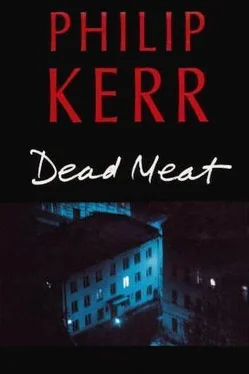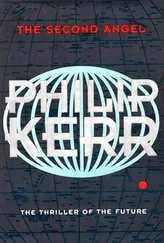‘To my face?’ he snarled. ‘You’d try and bribe me to my face? In front of all my men?’
The punch came up from Grushko’s waist and caught Bosenko flush underneath the jaw. As Bosenko hit the ground Grushko sprang forward to catch him by the lapels and hit him again.
Arriving on the scene it seemed to me that Sasha was moving to restrain Grushko. His yell of warning was lost in the larger sound of a gunshot and Grushko found himself supporting the man who had seemed to be holding him. He turned and saw one of Bosenko’s men escaping through the back door, gun in hand. Grushko let Sasha slip on to the floor and went after him.
There was blood running out of Sasha’s mouth. Nikolai dropped down on his knees and tried to turn his friend over on to his stomach in the coma position, to stop him drowning in his own blood. Sasha winced and held Nikolai’s arm.
‘I told you,’ he wheezed. ‘I told you — these flak jackets are no good.’
Then he jerked convulsively, as if hit by a small bolt of electricity, and was dead.
Stepan Starovyd, the Wrestler, came out of the cold store on to a cobbled alleyway. Seeing a distinctive blue OMON squad uniform he fired once again, and caught his man in the leg. Then he ran toward the Yekateringofka Canal and a pier where he knew Bosenko kept a small boat. Hearing the sound of running footsteps behind him, he spun round and squeezed off a couple of wild shots. The slide locked open on the last of them.
Grushko picked himself off the street and moved towards the Ukrainian.
The Wrestler could see that it was quite useless. There were men from the OMON squad behind the man he had fired at. But instinctively he continued to back away from Grushko towards the canal. He grinned sheepishly and started to raise his hands.
He was still backing away when Grushko shot him. The .45 calibre hollowpoint hit him square in the chest and carried him across the edge of the canal. The Wrestler was dead before he hit the dirty water, with such a look of surprise on his big, strong face that it was still there when, the next day, they put him on the section table at the Bureau of Judicial Medical Examinations.
Grushko walked over to the canal’s edge and looked down at the floating body. Then he spat into the water.
Nikolai met him as he walked back towards the cold store.
‘Sasha?’ said Grushko.
Nikolai shook his head.
‘No, I thought not.’
Inside the cold store the OMON squad had lined up all the Ukrainians against the wall and, filmed by Dmitri, were searching them for concealed weapons.
Grushko stood over Sasha’s body, hardly caring that his feet were surrounded by a spreading red flag that was the dead man’s blood. I went over to him, hoping to think of something kind to say and, finding myself speechless at the waste of it, could merely shrug and shake my head like some disappointed pensioner. But Grushko’s soul was made of more extrovert stuff. He said it as he saw it and, truth to tell, at the time the words from Pushkin’s epic poem, Eugene Onegin did not seem so affected as they do when I recall them now:
‘“The storm is over, dawn is paling, the bloom has withered on the bough; the altar flame’s extinguished now.”’
Nikolai lit a couple of cigarettes and handed one to Grushko.
‘Come on, sir,’ he said. ‘Let’s go home. It’s all over.’
Grushko gave him a baleful sort of look and Nikolai shrugged philosophically.
‘Well, until the next time anyway,’ he added.
Grushko sucked hard on the cigarette.
‘Nikolai Vladimirovich,’ he said, ‘you’ve been reading my bloody horoscope.’
Nina Milyukin had not mistaken Grushko. She had recognised him for what he was, a man of one book — the Book of the Law and Morals as he saw it, without benefit of equity, without mercy. Beware of a man of one book. That was how I began this story and now I must explain why.
A few days after we had arrested the Ukrainians he must have telephoned Nina and arranged to meet her at Mikhail’s grave in Volkov Cemetery. I can’t imagine that it would have been her idea to meet him there. That must have been part of his design. Did she guess what he wanted to say to her? I think she must have done. Perhaps she may even have thought that Grushko was one of them. After all, he was a Colonel of Militia. But if she did think that then she was quickly disabused of that idea.
He found her laying a single carnation — one was usually all that anyone could afford — on the bare earth covering Mikhail Milyukin’s coffin. Before she knew he was there he tossed the file he had brought with him beside her flower. Nina recognised it immediately. The sword and the shield stamped on the file’s buff cover were notorious. But she did not pick it up. She looked at the file almost as if it would have burned her to touch it.
‘I thought that you might like to dispose of this yourself,’ said Grushko. ‘Now that he’s dead it would seem that they have no further use for you.’
‘They?’ she said pointedly.
‘Oh no,’ said Grushko, shaking his head, ‘not me. I’ve never been part of that.’ He lit a cigarette and watched her as, reluctantly, she bent down to pick the file up.
‘You know, I couldn’t work out why you were being so reticent with us. I mean, there we were trying to find your husband’s killers and you said nothing. But of course when I saw that file everything suddenly started to make sense. It’s shame that makes one silent, isn’t it?’
‘They gave this to you?’ she said angrily. ‘Just like that? I don’t believe it.’
‘I had the very same thought myself,’ said Grushko. ‘How could you do it? How could you spy on your friends, on your own husband?’
‘It’s easy to ask that now,’ she said bitterly. ‘A lot of people can be brave in retrospect. But believe me, it wasn’t so easy to say no to the KGB.’ Her eyes flashed. ‘I’ve had to live with the fear of them all my life. Virtually the first thing I remember being scared of were the people who arrested my father.’
‘That’s a nice story,’ said Grushko, ‘but it doesn’t explain how you came to work for them.’
‘You’ve read the file,’ she sighed.
‘Yes, but it says you were passing them information as long ago as 1974, when you were still a student. That’s a long time.’
‘They said that they had proof that my mother was a dissident: that she regularly passed on copies of forbidden books. You think I was going to let them send her away too?’ Nina shook her head. ‘It wasn’t unusual, what I did. You should know that.’
She opened her handbag and took out a packet of cigarettes. She lit one and smoked it without much enjoyment.
‘For a while after university they left me alone. I was never that useful to them. I’m not the kind of person who ever remembers what anyone has said. But then, after I married Mikhail, they contacted me again. They said they would stop him from working because he was a Jew. Well, don’t you see? He could never have stood that. His work was his whole life. It was only little stuff, nothing important: foreign journalists Mikhail knew. What they were saying. Who they met. But after a year or two Mikhail noticed something, I think. He never said anything, but I’m sure he suspected something.’
‘That’s why he became secretive with you about his work, isn’t it?’ said Grushko. ‘It wasn’t because he didn’t want you to worry about him. It was because he wasn’t sure if he could trust you or not.’
‘You see?’ she shrugged. ‘In a way, I was telling you the truth. I really didn’t know anything after all.’
‘So then what happened?’
‘If Mikhail went out, he didn’t tell me where he was going, or who he was seeing. Nobody came back to the flat. I stopped being much use to them. So they went after Mikhail himself. They wanted him to spy on an English journalist, someone they suspected of having an intelligence connection. And he told them to go to hell. He said they could do what they liked. They made all sorts of threats. And of course he was scared. But Mikhail was stronger than me.’
Читать дальше












